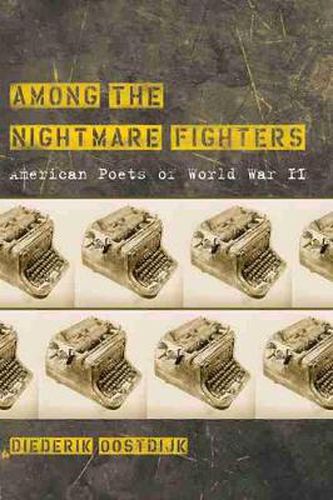Readings Newsletter
Become a Readings Member to make your shopping experience even easier.
Sign in or sign up for free!
You’re not far away from qualifying for FREE standard shipping within Australia
You’ve qualified for FREE standard shipping within Australia
The cart is loading…






In the first comprehensive study of the American male poets of World War II, Diederik Oostdijk gives voice to the literary men still considered to be a part of the Silent Generation. Focusing not only on soldier poets, but also on conscientious objectors and those deemed unfit for military service, Among the Nightmare Fighters sheds light on the struggles faced by writers–including Randall Jarrell, Anthony Hecht, Robert Lowell, Howard Nemerov, William Stafford and others–from the onset of the U.S. involvement in the war in Europe to the painful physical and psychological aftereffects soldiers carried with them following their service years.
Enriched with extensive historical and personal background information drawn from the poets’ archives, Oostdijk’s study explores the internal confusion expressed by the World War II poets who felt overshadowed by the past generation of Great War poets in their own conflicts with notions of identity, manhood, and the haunting aftermath of war. Collectively their poems form an important and sobering antidote to the sometimes overly positive celebrations of the Good War and the Greatest Generation, recapturing some of the anxiety, frustration, and bitter sadness that the war years also occasioned.
Oostdijk demonstrates the importance of appreciating these men not only as a collective literary group, but also as solitary writers experiencing the hardships and adversities of war on an individual level. He emphasizes each author’s distinctive perceptions of the disasters they witnessed and the conflicts they witnessed–such as Karl Shapiro’s struggle with his Jewish identification, James Dickey’s fascination with the meaning and projection of manhood, Nemerov’s perception of war’s effect on American society, and Ciardi’s preoccupation with traumatizing combat memories. A factor that connected these men in their responses to war was their overreaching efforts to identify as individuals and not merely as blurred faces among the myriad combatants, a goal that Oostdijk acknowledges in recognizing the unique experiences of his subjects as key to interpreting their poetry.
Among the Nightmare Fighters has both literary and historical merits as a means to comprehend in a more detailed manner the events that took place on the battlefields and the home front and the psychological effects World War II had on the returning American soldiers. Oostdijk’s study echoes with the whispers of these American poets and recognizes the significance their work had on literary history in their time and since.
$9.00 standard shipping within Australia
FREE standard shipping within Australia for orders over $100.00
Express & International shipping calculated at checkout
In the first comprehensive study of the American male poets of World War II, Diederik Oostdijk gives voice to the literary men still considered to be a part of the Silent Generation. Focusing not only on soldier poets, but also on conscientious objectors and those deemed unfit for military service, Among the Nightmare Fighters sheds light on the struggles faced by writers–including Randall Jarrell, Anthony Hecht, Robert Lowell, Howard Nemerov, William Stafford and others–from the onset of the U.S. involvement in the war in Europe to the painful physical and psychological aftereffects soldiers carried with them following their service years.
Enriched with extensive historical and personal background information drawn from the poets’ archives, Oostdijk’s study explores the internal confusion expressed by the World War II poets who felt overshadowed by the past generation of Great War poets in their own conflicts with notions of identity, manhood, and the haunting aftermath of war. Collectively their poems form an important and sobering antidote to the sometimes overly positive celebrations of the Good War and the Greatest Generation, recapturing some of the anxiety, frustration, and bitter sadness that the war years also occasioned.
Oostdijk demonstrates the importance of appreciating these men not only as a collective literary group, but also as solitary writers experiencing the hardships and adversities of war on an individual level. He emphasizes each author’s distinctive perceptions of the disasters they witnessed and the conflicts they witnessed–such as Karl Shapiro’s struggle with his Jewish identification, James Dickey’s fascination with the meaning and projection of manhood, Nemerov’s perception of war’s effect on American society, and Ciardi’s preoccupation with traumatizing combat memories. A factor that connected these men in their responses to war was their overreaching efforts to identify as individuals and not merely as blurred faces among the myriad combatants, a goal that Oostdijk acknowledges in recognizing the unique experiences of his subjects as key to interpreting their poetry.
Among the Nightmare Fighters has both literary and historical merits as a means to comprehend in a more detailed manner the events that took place on the battlefields and the home front and the psychological effects World War II had on the returning American soldiers. Oostdijk’s study echoes with the whispers of these American poets and recognizes the significance their work had on literary history in their time and since.